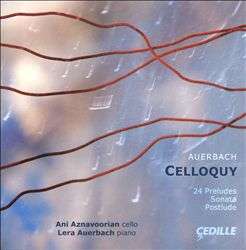|
Back
06/22/2013
"Celloquy"
Lera Auerbach: 24 Preludes, Sonata, & Postlude
Ani Aznavoorian (cello), Lera Auerbach (piano)
Recorded at the State University of New York, Purchase College (August, 2012) – 75’12
Cedille Records CDR 90000 137 – Booklet in English

   
Printed in the CD booklet of Lera Auerbach’s "Celloquy", the composer-pianist includes her poem Fugue with such immersive lines as “I am choreographing my own discontent” and “that moment of infinite loneliness when sound dies”. In Abyss there is more hope - “then finally you see deep within the abyss/another sun/and stars of another universe/calling to you with their flickering dance.”
As in her verse, there is both nihilism and optimism in Auerbach’s 24 Preludes for violoncello and piano, a 50-minute distillation of the themes expressed in her poetry and the longest work on this mesmerizing recording. Like Debussy and other piano studies of this dimension, it demands that you consider it in the entire composition.
Compositionally, Auerbach’s atmosphere taps archaic Italian piano forms, uniquely explored. Her previous recordings of childhood Mozart works with a sense of new wonder and is recorded very well, a warm recording that captures her unique expressiveness. Similarly here she writes to a very specific form with deviations from the form that have instructive musical intent. Withal, Auerbach’s musical atmosphere is both intimate and epic.
From the lush dirge of the opening Andante where dark, 20th century modals creep in, to an Adagio with its scratchy cello line and a hollow piano sound, the composer paints a picture of mocking tragedy. In contrast, the Andantino grazioso is laced with baroque string lushness and, in the development, is full of hope and wonder. Then the string and piano dialogue, more like an argument, has Bach DNA sardonically bounced around. A driving piano sound opens di valzer like a mid-20th century abstraction, then it wends around a writhing cello decrescendo, inside a descending waltz that would make Prokofiev jump. It is dazzlingly macabre, as is the cello chord cluster fade in Andante Tragico that is cinematically eerie in its acoustic effect. Vivo, the finale, along with Adagio (m. 12), the longest preludes (both just under five minutes), are expansive as the dark romps give way to simple, melodic piano lines.
Auerbach’s bows to other composers, from Bach to Mendelssohn, are dropped in, joyously, like jazz lines. One minute con brio sounds like a riff spun out of Le sacre du printemps that progresses toward a demented waltz complete with off-key string lines and wounded instrument cries. These are dark and showy explorations that burst through the seriousness of “preludes in studio” recordings. One quote has a melody that sounds like one of the gang numbers from West Side Story, another, the vertiginous cello sounding like Brian Easdale in The Red Shoes. Auerbach and Aznavoorian are definitely pulling some strings and some legs.
Auerbach includes her five-partSonata, which is just as raucous a study of form and mood (the 4th movement Con Estrema insensita couldn’t be more distraught if Medea were in the room). All along Auerbach and Aznavoorian draw us into a musical vortex. Recorded over three days in August 2012 at SUNY Purchase, producer-engineer Adam Abeshouse captures the uniqueness of the three works of "Celloquy".
Lewis Whittington
|